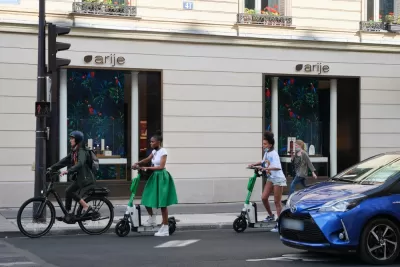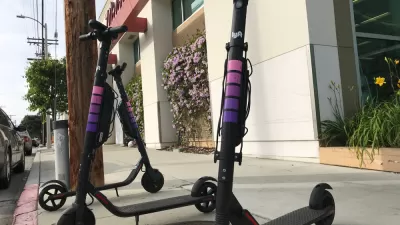Cities should expect to see increases in automobile trips, and resulting consequences, if they ban or limit the use of electric scooters or other micromobility devices, according to new research.

According to research published via open access by the journal Nature Energy, banning the use of micromobility devices (i.e., electric scooters) at night leads to a large increase in automobile trips.
The research generated reports findings of a natural experiment in Atlanta, where the city set geofences on rented scooters to disable their operation at night—“guaranteeing near perfect compliance.”
“Evidence from a natural experiment in [Atlanta] shows increases in travel time of 9–11% for daily commuting and 37% for large events,” according to the study's authors.
As noted in the study's literature review, prior research into micromobility has revealed little about the effects of the mode's adoption on automobile traffic. Findings have focused instead on loss of public transit trips as a result of shared micromobility. Notably, scooters have the opposite effect on mode share when compared to ride-hailing companies, which displace riders from public transit and active modes like biking and walking.
FULL STORY: Impacts of micromobility on car displacement with evidence from a natural experiment and geofencing policy

Planetizen Federal Action Tracker
A weekly monitor of how Trump’s orders and actions are impacting planners and planning in America.

Congressman Proposes Bill to Rename DC Metro “Trump Train”
The Make Autorail Great Again Act would withhold federal funding to the system until the Washington Metropolitan Area Transit Authority (WMATA), rebrands as the Washington Metropolitan Authority for Greater Access (WMAGA).

DARTSpace Platform Streamlines Dallas TOD Application Process
The Dallas transit agency hopes a shorter permitting timeline will boost transit-oriented development around rail stations.

Car-Centric LA Suburb Looks to a Train-Oriented Future
City leaders in Rancho Cucamonga, the future western terminus of the Brightline West rail line to Las Vegas, want to reimagine the city as a transit-oriented, pedestrian-friendly community.

New Alaska Bitcoin Mine Would Burn as Much Energy as the State’s Largest Coal Plant
Fueled by “stranded” natural gas, the startup hopes to become the largest in the US, and to make Alaska an industry center.

New Jersey Duplexes Elicit Mixed Reactions
Modern, two-unit residences are proliferating in northern New Jersey communities, signaling for some a boon to the housing supply and to others a loss of historic architecture.
Urban Design for Planners 1: Software Tools
This six-course series explores essential urban design concepts using open source software and equips planners with the tools they need to participate fully in the urban design process.
Planning for Universal Design
Learn the tools for implementing Universal Design in planning regulations.
Municipality of Princeton
Roanoke Valley-Alleghany Regional Commission
City of Mt Shasta
City of Camden Redevelopment Agency
City of Astoria
Transportation Research & Education Center (TREC) at Portland State University
US High Speed Rail Association
City of Camden Redevelopment Agency
Municipality of Princeton (NJ)





























